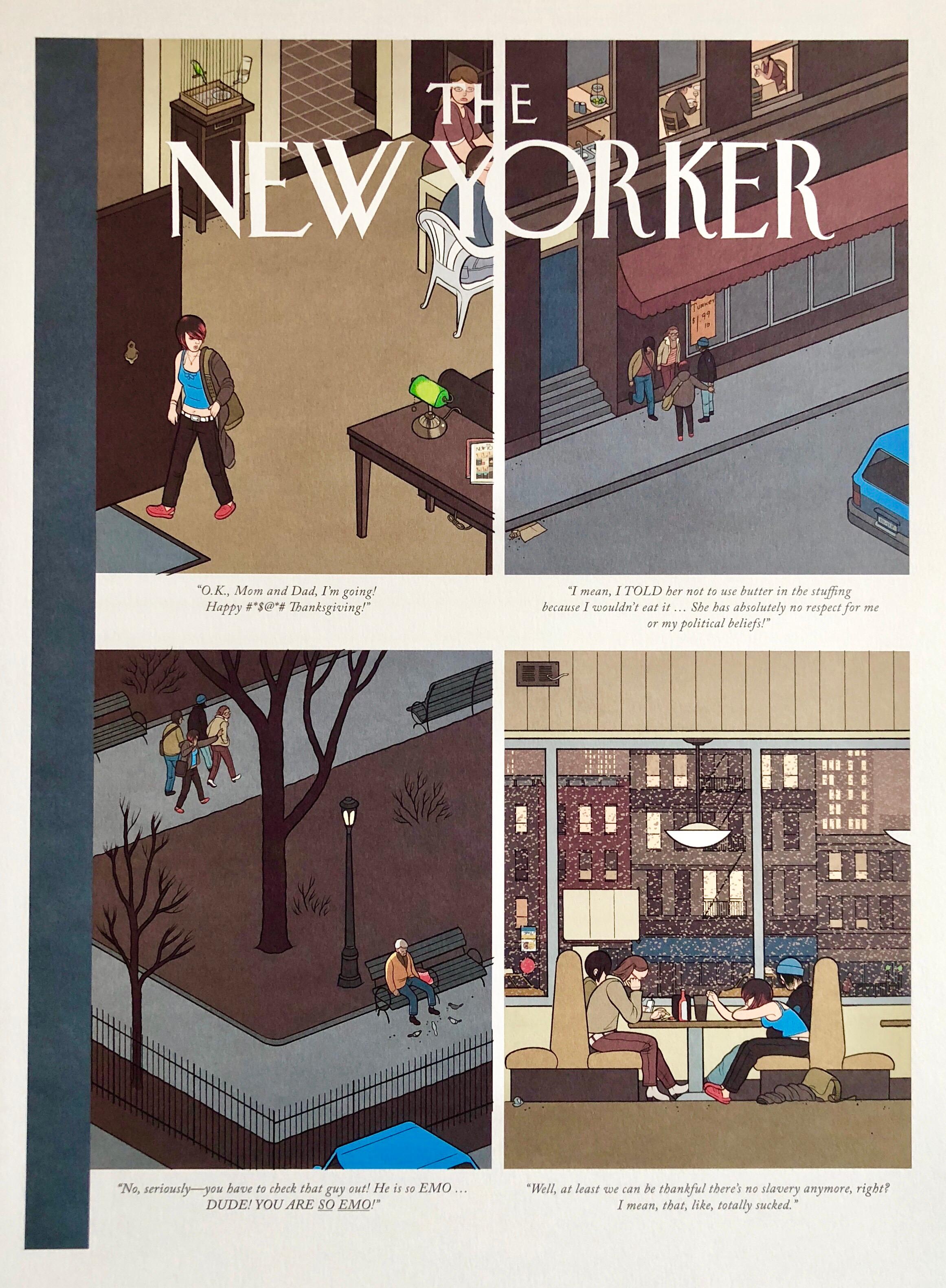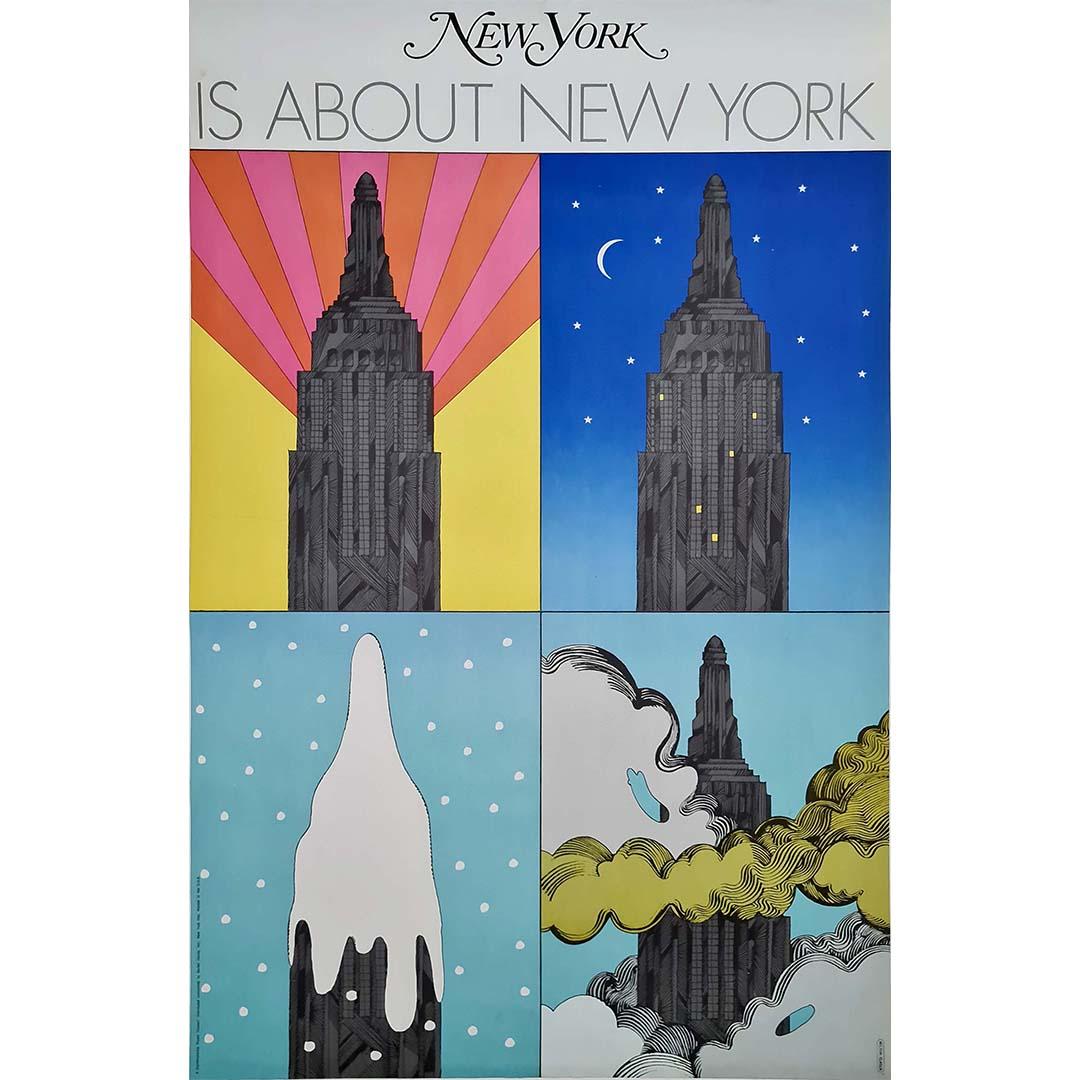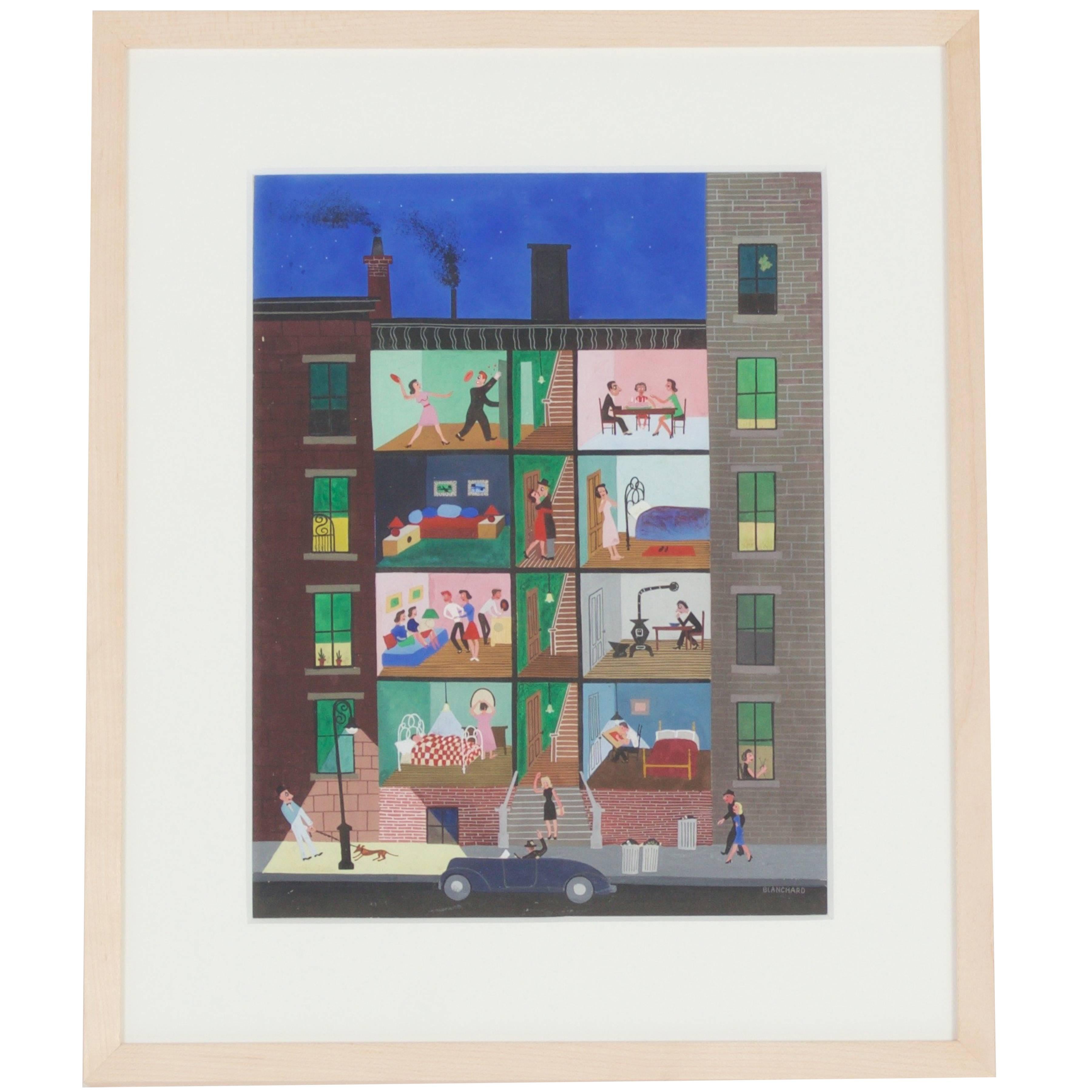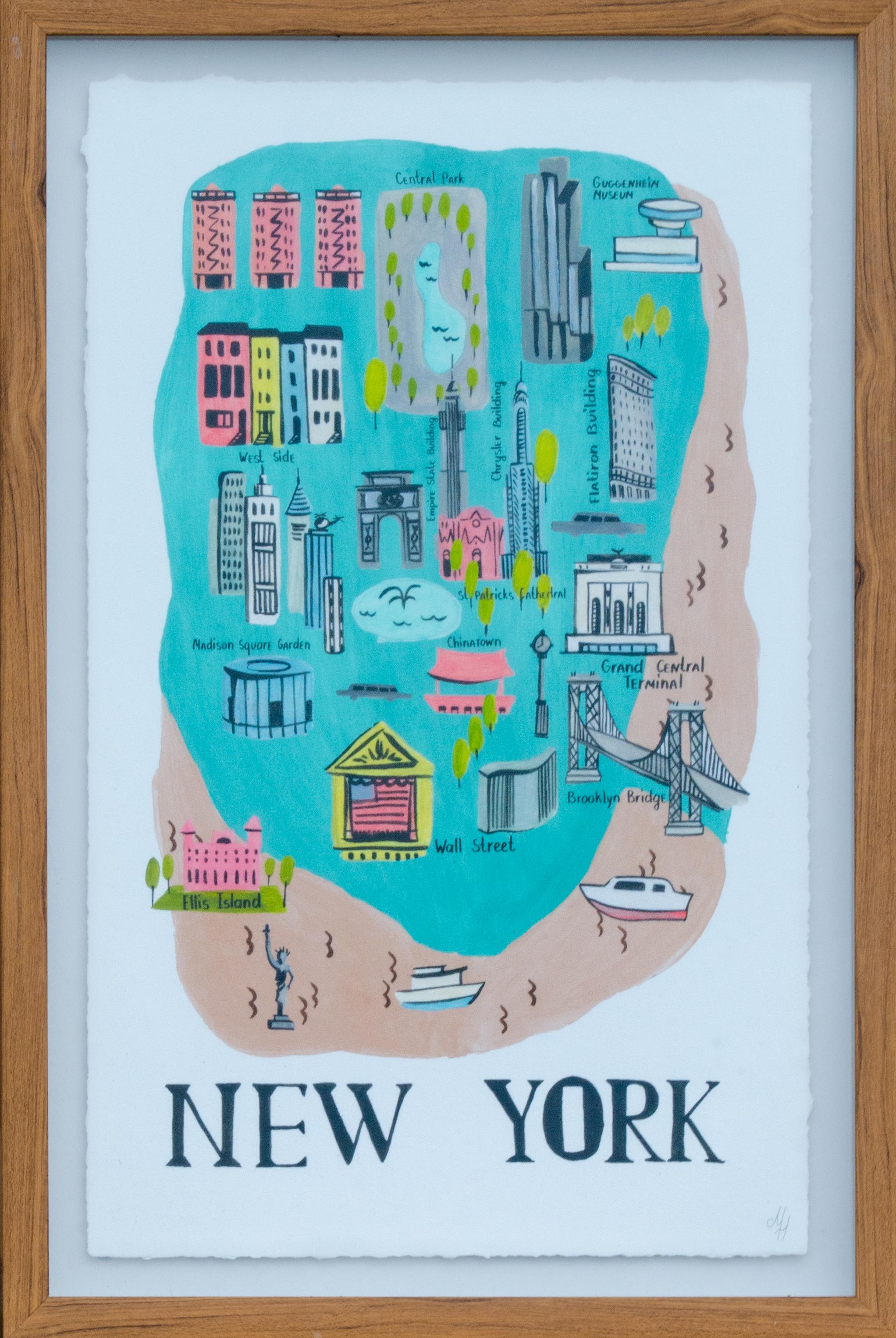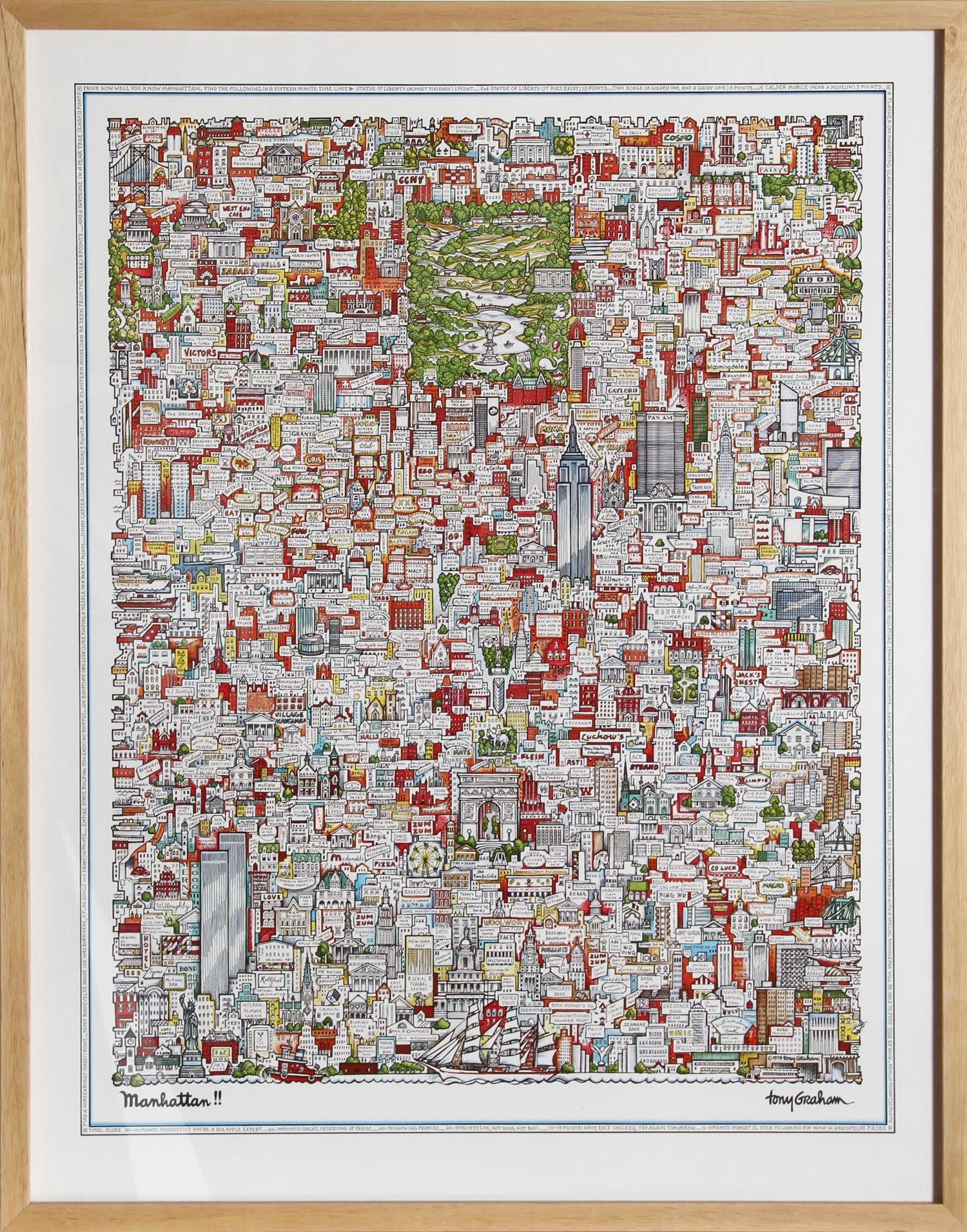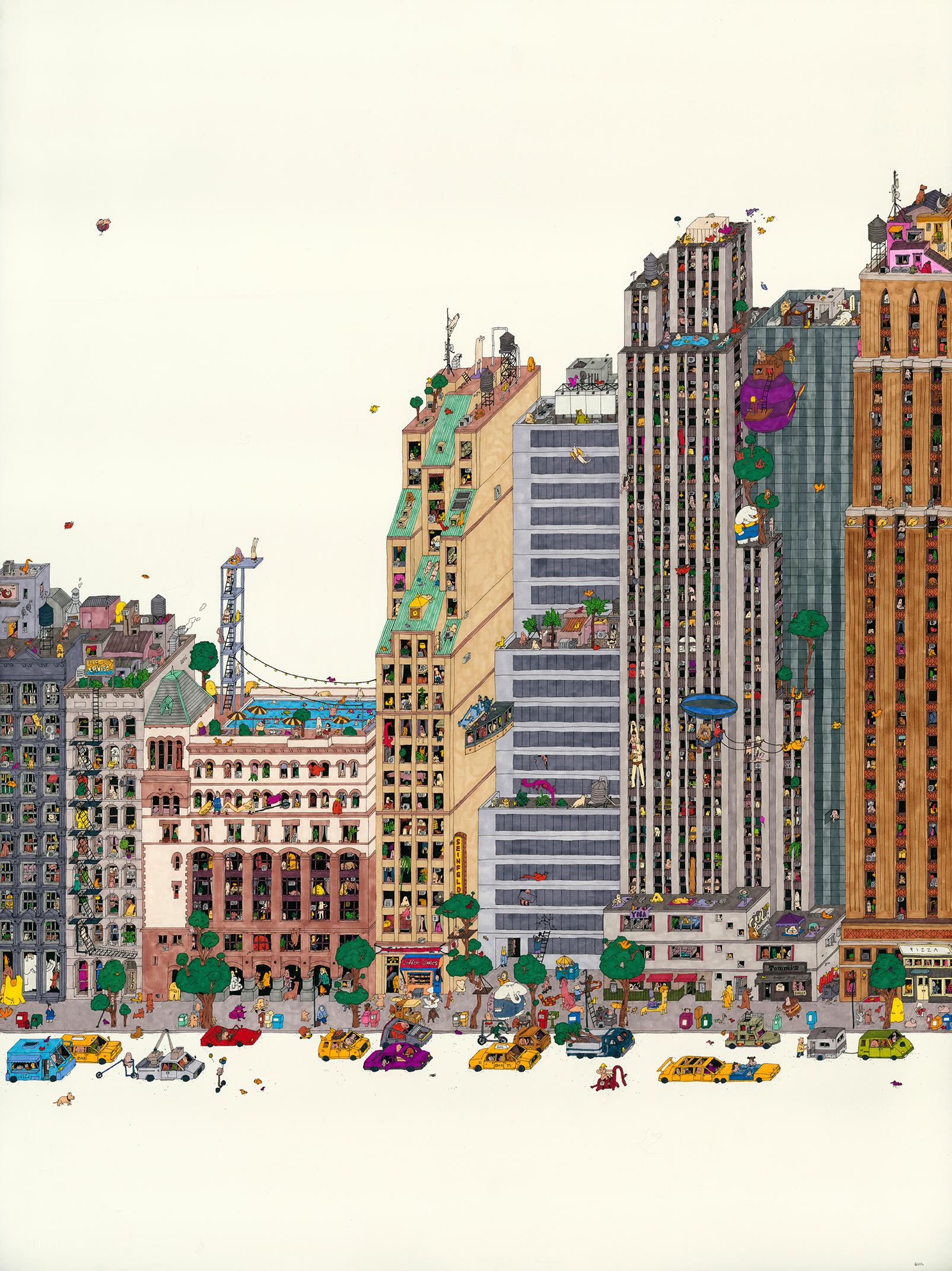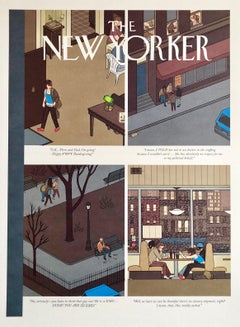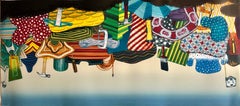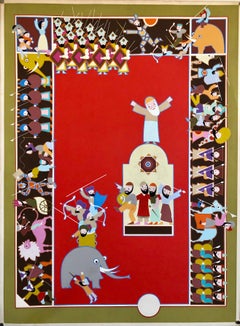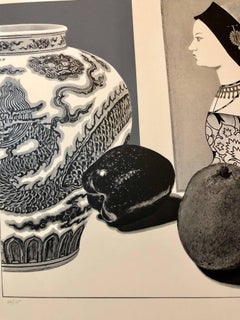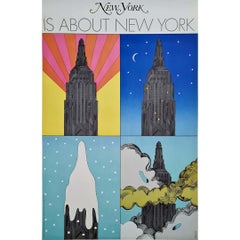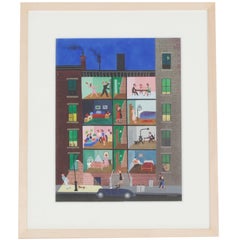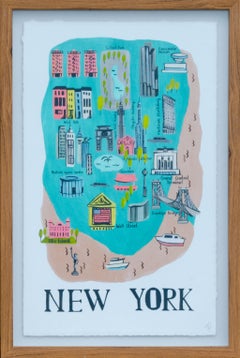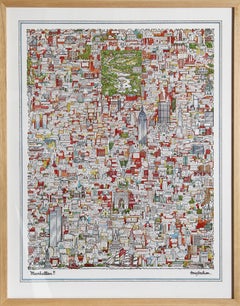Items Similar to Chris Ware New Yorker Cartoonist Limited Edition Thanksgiving Print NYC
Want more images or videos?
Request additional images or videos from the seller
1 of 12
Chris WareChris Ware New Yorker Cartoonist Limited Edition Thanksgiving Print NYC2006
2006
$250
£190.46
€217.36
CA$351.31
A$382.87
CHF 202.74
MX$4,598.61
NOK 2,566.78
SEK 2,359.90
DKK 1,623.42
About the Item
This is one print – printed in full color on 15" x 20" heavy cream-colored paper.
It is from a limited edition series of 175,
the portfolio is hand numbered and hand signed by Chris Ware. the individual prints are not.
The page with the hand signature is included here as a photo for reference only it is not included in this sale.
Franklin Christenson "Chris" Ware (born December 28, 1967), is an American cartoonist known for his Acme Novelty Library series (begun 1994) and the graphic novel Jimmy Corrigan, the Smartest Kid on Earth (2000) and Building Stories (2012). His works explore themes of social isolation, emotional torment and depression. He tends to use a vivid color palette and realistic, meticulous detail. His lettering and images are often elaborate and sometimes evoke the ragtime era or another early 20th-century American design style.
Ware often refers to himself in the publicity for his work in self-effacing, even withering tones. He is considered by some critics and fellow notable illustrators and writers, such as Dave Eggers, to be among the best currently working in the medium; Canadian graphic-novelist Seth has said, "Chris really changed the playing field. After him, a lot of [cartoonists] really started to scramble and go, 'Holy [expletive], I think I have to try harder.'"
While still a sophomore at UT, Ware came to the attention of Art Spiegelman, who invited Ware to contribute to Raw, the influential anthology magazine Spiegelman was co-editing with Françoise Mouly. Ware has acknowledged that being included in Raw gave him confidence and inspired him to explore printing techniques and self-publishing. His Fantagraphics series Acme Novelty Library defied comics publishing conventions with every issue.
Ware's art reflects early 20th-century American styles of cartooning and graphic design, shifting through formats from traditional comic panels to faux advertisements and cut-out toys. Stylistic influences include advertising graphics from that same era; newspaper strip cartoonists Winsor McCay (Little Nemo in Slumberland) and Frank King (Gasoline Alley); Charles Schulz's post-WWII strip Peanuts and the cover designs of ragtime-era sheet music. Ware has spoken about finding inspiration in the work of artist Joseph Cornell and cites Richard McGuire's strip Here as a major influence on his use of non-linear narratives. He is one of the great practitioners who have elevated the graphic novel style along with, Shepard Fairey, Ben Katchor and Robert Crumb.
Quimby the Mouse was an early character for Ware and something of a breakthrough. Rendered in the style of an early animation character like Felix the Cat, Quimby the Mouse is perhaps Ware's most autobiographical character.
Ware's Building Stories was serialized in a host of different venues. It first appeared as a monthly strip in Nest Magazine. Installments later appeared in a number of publications, including The New Yorker, Kramer's Ergot, and most notably, the Sunday New York Times Magazine. Building Stories appeared weekly in the New York Times Magazine from September 18, 2005 until April 16, 2006. A full chapter was published in Acme Novelty Library, number 18. Another installment was published under the title "Touch Sensitive" as a digital app released through McSweeneys. The entire narrative was published as a boxed set of books by Pantheon in October 2012.
Ware was commissioned by Chip Kidd to design the inner machinations of the bird on the cover of Haruki Murakami's novel The Wind-Up Bird Chronicle.
In 2011, Ware created the poster for the U.S. release of the 2010 Palme d'Or winning film Uncle Boonmee Who Can Recall His Past Lives by Thai director Apichatpong Weerasethakul.
Awards and honors
Over the years his work garnered several awards, including the 1999 National Cartoonists Society's Award for Best Comic Book for Acme Novelty Library and Award for Graphic Novel for Building Stories.
Ware has won numerous Eisner Awards and multiple Harvey Awards. In 2002, Ware became the first comics artist to be invited to exhibit at Whitney Museum of American Art biennial exhibition. With Will Eisner, Jack Kirby, Harvey Kurtzman, Robert Crumb and Gary Panter, Ware was among the artists honored in the exhibition "Masters of American Comics" at the Jewish Museum in New York City, New York, from September 16, 2006 to January 28, 2007. His work was the subject of solo exhibitions at the Museum of Contemporary Art, Chicago in 2006 and at the University of Nebraska's Sheldon Museum of Art, in 2007.
Many famous artists have done covers for the New Yorker Magazine including, Saul Steinberg, Maira Kalman, Art Spiegelman, Francoise Mouly, Charles Addams, Peter Arno, Roz Chast, Ed Koren, William Steig, James Thurber and many others. This one is a fresh contemporary take on the Norman Rockwell classic.
Ware's graphic novel Jimmy Corrigan, the Smartest Kid on Earth won the 2001 Guardian First Book Award, the first time a graphic novel has won a major United Kingdom book award. It also won the prize for best album at the 2003 Angoulême International Comics Festival in France.
In 2006, Ware received a USA Hoi Fellow grant from United States Artists.
In 2013, Ware received the 2013 Lynd Ward Graphic Novel Prize for Building Stories and was finalist for Jan Michalski Prize for Literature and Los Angeles Times Book Prize.
- Creator:Chris Ware (1967)
- Creation Year:2006
- Dimensions:Height: 20 in (50.8 cm)Width: 15 in (38.1 cm)
- Movement & Style:
- Period:
- Condition:
- Gallery Location:Surfside, FL
- Reference Number:1stDibs: LU38213675012
About the Seller
4.9
Platinum Seller
Premium sellers with a 4.7+ rating and 24-hour response times
Established in 1995
1stDibs seller since 2014
1,843 sales on 1stDibs
Typical response time: 1 hour
- ShippingRetrieving quote...Shipping from: Surfside, FL
- Return Policy
More From This Seller
View AllChris Ware New Yorker Cartoonist Limited Edition Thanksgiving Print NYC
By Chris Ware
Located in Surfside, FL
This is one print – printed in full color on 15" x 20" heavy cream-colored paper.
It is from a limited edition series of 175,
the portfolio is hand numbered and hand signed by Chris Ware. the individual prints are not.
The page with the hand signature is included here as a photo for reference only it is not included in this sale.
Franklin Christenson "Chris" Ware (born December 28, 1967), is an American cartoonist known for his Acme Novelty Library series (begun 1994) and the graphic novel Jimmy Corrigan, the Smartest Kid on Earth (2000) and Building Stories (2012). His works explore themes of social isolation, emotional torment and depression. He tends to use a vivid color palette and realistic, meticulous detail. His lettering and images are often elaborate and sometimes evoke the ragtime era or another early 20th-century American design style.
Ware often refers to himself in the publicity for his work in self-effacing, even withering tones. He is considered by some critics and fellow notable illustrators and writers, such as Dave Eggers, to be among the best currently working in the medium; Canadian graphic-novelist Seth has said, "Chris really changed the playing field. After him, a lot of [cartoonists] really started to scramble and go, 'Holy [expletive], I think I have to try harder.'"
While still a sophomore at UT, Ware came to the attention of Art Spiegelman, who invited Ware to contribute to Raw, the influential anthology magazine Spiegelman was co-editing with Françoise Mouly. Ware has acknowledged that being included in Raw gave him confidence and inspired him to explore printing techniques and self-publishing. His Fantagraphics series Acme Novelty Library defied comics publishing conventions with every issue.
Ware's art reflects early 20th-century American styles of cartooning and graphic design, shifting through formats from traditional comic panels to faux advertisements and cut-out toys. Stylistic influences include advertising graphics from that same era; newspaper strip cartoonists Winsor McCay (Little Nemo in Slumberland) and Frank King (Gasoline Alley); Charles Schulz's post-WWII strip Peanuts and the cover designs of ragtime-era sheet music. Ware has spoken about finding inspiration in the work of artist Joseph Cornell and cites Richard McGuire's strip Here as a major influence on his use of non-linear narratives. He is one of the great practitioners who have elevated the graphic novel style along with, Shepard Fairey, Ben Katchor and Robert Crumb.
Quimby the Mouse was an early character for Ware and something of a breakthrough. Rendered in the style of an early animation character like Felix the Cat, Quimby the Mouse is perhaps Ware's most autobiographical character.
Ware's Building Stories was serialized in a host of different venues. It first appeared as a monthly strip in Nest Magazine. Installments later appeared in a number of publications, including The New Yorker, Kramer's Ergot, and most notably, the Sunday New York Times Magazine. Building Stories appeared weekly in the New York Times Magazine from September 18, 2005 until April 16, 2006. A full chapter was published in Acme Novelty Library, number 18. Another installment was published under the title "Touch Sensitive" as a digital app released through McSweeneys. The entire narrative was published as a boxed set of books by Pantheon in October 2012.
Ware was commissioned by Chip Kidd to design the inner machinations of the bird on the cover of Haruki Murakami's novel The Wind-Up Bird Chronicle.
In 2011, Ware created the poster for the U.S. release of the 2010 Palme d'Or winning film Uncle Boonmee Who Can Recall His Past Lives by Thai director Apichatpong Weerasethakul.
Awards and honors
Over the years his work garnered several awards, including the 1999 National Cartoonists Society's Award for Best Comic Book for Acme Novelty Library and Award for Graphic Novel for Building Stories.
Ware has won numerous Eisner Awards and multiple Harvey Awards. In 2002, Ware became the first comics artist to be invited to exhibit at Whitney Museum of American Art biennial exhibition. With Will Eisner, Jack Kirby, Harvey Kurtzman, Robert Crumb and Gary Panter, Ware was among the artists honored in the exhibition "Masters of American Comics" at the Jewish Museum in New York City, New York, from September 16, 2006 to January 28, 2007. His work was the subject of solo exhibitions at the Museum of Contemporary Art, Chicago in 2006 and at the University of Nebraska's Sheldon Museum of Art, in 2007.
Many famous artists have done covers for the New Yorker Magazine including, Saul Steinberg, Maira Kalman, Art Spiegelman, Francoise Mouly, Charles Addams, Peter Arno, Roz Chast, Ed Koren...
Category
Early 2000s American Modern Figurative Prints
Materials
Color
Color Lithograph Linocut Chine Collé "Workshop" Bright Modernist Pop Art
By Tom Burckhardt
Located in Surfside, FL
Hand signed and numbered edition of 25. 16 x 36" sheet size without frame.
“Workshop” is an ambitious color lithograph and linocut with chine collé printed in twelve colors from nine plates and one linocut. It has been printed in an edition of 25, plus proofs, on white Rives BFK paper 16 x 36” with chine collé of various papers. (No, it’s not upside down)
Born 1964 in New York where he still currently resides and works alongside his partner the ceramist Kathy Butterly. Son of the photographer Rudy Burckhardt and painter Yvonne Jacquette, Tom Burckhardt was 1986, BFA, State University of New York, Purchase, NY
1992–1993, Skowhegan School of Painting and Sculpture, ME
1996, Marie Walsh Sharpe Art Foundation Studio Grant
1997, New York Foundation for the Arts, Painting Grant
1997 Pollock-Krasner Foundation Grant
2002 George Hitchcock Award, National Academy of Arts
2003, Richard & Hinda Rosenthal Foundation Award, American Academy
2005, AICA Best Show of an Emerging or Underknown Artist
2005 Pollock-Krasner Foundation Grant
2006 Best Installation, Best of Houston, the Houston Press
2009 Guggenheim Foundation Grant
2010, New York Foundation for the Arts Drawing/Print Grant
2010 Joan Mitchell Foundation Grant
Tom Burckhardt’s work is a carnival of images jumbled and jostling each other in precarious nonsensical compositions. He uses lushly colored and patterned images from all kinds of sources that bounce between abstraction and representation. Images come from tool catalogs, paper and fabric patterns, funhouse painting, architectural details, stripes, dots and squiggles. It is as if Burckhardt is a cartoonist merrily channeling Ellsworth Kelly, Paul Feeley, Robert Therrien, and Myron Stout, among others. Like Red Grooms, for whom he worked as an assistant, Burckhardt ransacks his influences yet ends up with something unmistakably his own. His work bears the influence of is a synthesis of many things: the tribal-influenced abstract painting of Steve Wheeler...
Category
Early 2000s Pop Art Interior Prints
Materials
Lithograph, Linocut
Israeli Modern Hanukkah Lithograph Silkscreen David Sharir Holiday Serigraph Art
By David Sharir
Located in Surfside, FL
This is a mixed lithograph and serigraph silkscreen as per descriptions i read. this is not signed or numbered and is marked sample. it is a rare artists or printers proof print.
David Sharir was born in 1938 in Tel Aviv, Israel and currently resides there.
David Sharir, the son of Russian immigrants, was born in Israel. Beginning his study of art in Tel Aviv and continuing in Florence and Rome, where he studied architecture and theater design. The brightly colored costumes and intricate stage designs he created for these productions have profoundly influenced his art. When Sharir moved to Jaffa in 1966, his hallmark style was truly developed. Studio, family, and spiritual devotion all serve as inspiration for the imagery in his work. His evolving style combines personal experience, Biblical symbolism, and fantasy.
David Sharir, born 1938, Tel Aviv. Was among the first artists to settle in Old Jaffa in 1966. He depicted biblical subjects with a touch of humour and designed sets and costumes for the theatre and opera.
Graphic Art in Israel Today Tel Aviv Museum, Tel Aviv 1973
Israel 1948-1958: Watercolors, Drawings, Graphics
The Bezalel National Museum, Jerusalem 1958
Jean David, Yosl Bergner, Menachem Shemi, Zvi Mairovich, Ruth Schloss, Nahum Gutman, Moshe Elazar Castel...
Category
20th Century Contemporary Figurative Prints
Materials
Lithograph
Still Life with Hans Maler Pop Art Serigraph Hand Signed
By Josef Levi
Located in Surfside, FL
On deckle edged watermarked Arches French paper. hand signed in pencil, dated and numbered. the edition size is 175.
there are three states of the same image image each with increasing detail and color. This is just for the one in the photo.
Josef Alan Levi (1938) is an American artist whose works range over a number of different styles, but which are unified by certain themes consistently present among them. Josef Levi began his artistic career in the 1960s and early '70s, producing highly abstract and very modernist pieces: these employing exotic materials such as light fixtures and metallic parts. By 1975, Levy had transitioned to painting and drawing still lifes. At first these were, traditionally, of mundane subjects. Later, he would depict images from art history, including figures originally created by the Old Masters. Around 1980, he made another important shift, this time toward creating highly precise, though subtly altered reproductions of pairs of female faces which were originally produced by other artists. It is perhaps this work for which he is most well known. Since around 2000, Josef Levi has changed the style of his work yet again: now he works entirely with computers, using digital techniques to abstract greatly from art history, and also from other sources.
Levi's works of art in the collections of the Museum of Modern Art, NYC, the National Gallery of Art, and the Albright-Knox Museum, among many others. Levi's art has been featured on the cover of Harper's Magazine twice, once in June 1987, and once in May 1997.
Josef Levi received a Bachelor of Arts degree in 1959 from the University of Connecticut, where he majored in fine arts and minored in literature. From 1959 to 1960, he served to a first lieutenant in the U.S. Army, and from 1960 through 1967 he was in the U.S. Army Reserves.
In 1966, he received the Purchase Award from the University of Illinois in 1966, and he was featured in New Talent U.S.A. by Art in America. He was an artist in residence at Appalachian State University in 1969, taught at Farleigh Dickenson University in 1971 and was a visiting professor of art at Pennsylvania State University in 1977. From 1975 to 2007, Levi resided in New York City. He now lives in an apartment in Rome, where he is able to paint with natural light as he was unable in New York.
From 1959 to 1960, Josef took some courses of Howard McParlin Davis and Meyer Schapiro at Columbia University which initiated him into the techniques of reproducing the works of the Old Masters. His first works, created in the 1960s, were wood and stone sculptures of women. His first mature works were abstract pieces, constructed of electric lights and steel.
In 1970, Levi's materials included fluorescent light bulbs, Rust-Oleum and perforated metal in addition to paint and canvas.
By 1980, Josef Levi's art had transformed into a very specific form: a combination of reproductions of female faces which were originally depicted by other artists. The faces which he reproduces may be derived from either portraits or from small portions of much larger works; they are taken from paintings of the Old Masters, Japanese ukiyo-e, and 20th-century art. Artists from whom he has borrowed include: Vermeer, Rembrandt, Piero della Francesca, Botero, Matisse, Utamaro, Correggio, Da Vinci, Picasso, Chuck Close, Max Beckmann, Pisanello, Lichtenstein. The creation of these works is informed by Levi's knowledge and study of art history.
Josef Levi's paintings from this period are drawn, then painted on fine linen canvas on wooden stretchers. The canvas is coated with twenty-five layers of gesso in order to produce a smooth surface on which to work. The drawing phase takes at least one month. Levi seals the drawing with acrylic varnish, and then he may apply layers of transparent acrylic in order to approximate the look of old paintings. After the last paint is applied, another layer of acrylic varnish is sprayed on to protect the work.
Most of the figures in his contemporary pieces are not paired with any others.
SELECTED COLLECTIONS
MUSEUM OF MODERN ART, NEW YORK, NY
ALBRIGHT- KNOX GALLERY, BUFFALO, NY
ALDRICH MUSEUM OF CONTEMPORARY ART, RIDGEFIELD, CT
NATIONAL GALLERY OF ART, WASHINGTON, DC
BROOKLYN MUSEUM OF ART, BROOKLYN, NY
SMITHSONIAN NATIONAL MUSEUM OF AMERICAN HISTORY, WASHINGTON, DC
CORCORAN GALLERY, WASHINGTON, DC
UNIVERSITY OF NOTRE DAME ART...
Category
1970s Pop Art Figurative Prints
Materials
Lithograph, Screen
Large Pop Art Cartoon Acrylic Painting By Syndicated Cartoonist R.P. Overmyer
Located in Surfside, FL
R.P. Overmyer (American, 1948-2010).
An original oil painting (this might be acrylic) on canvas. A figural Pop Art work painted in an abstract whimsical style, featuring an interior scene of bloody murder, with corpse figure, bullet riddled wall and chair, picture frame with photograph, and additional forms. Artist signature to bottom R.P. OVERMYER. The artist was a syndicated cartoonist and creator of the popular strip, "Hollywood Dog."
Work Size: 29.5 x 39.5 in.
Dimensions: 30 X 40.25 X 1.75 in.
Overmyer was a longtime LA-based cartoonist and designer. His newspaper clients included LA Weekly and the San Jose Metro Weekly; his animation employers included Fox and Universal Studios.
He may be best known for his Hollywood Dog feature, which was nationally syndicated in its current, political-cartoon illustration art form since I believe January 2006 and included the Los Angeles Times among its clients. The feature was originally a comic strip for the Los Angeles Reader, was trademarked for t-shirt production in 1989, and was briefly the basis for a television show in the post-Simpsons 1990s. That show appeared in 1993 and feature Simpsons utility performer Hank Azaria as the voice of the title character. He is from a long line of outsider, alternative, underground comics, cartoonist movement like Robert Crumb, Art Spiegelman, Chris Ware, Harvey Pekar, Ben Katchor, Ralph Bakshi...
Category
20th Century American Modern Figurative Paintings
Materials
Canvas
Hand signed Folk Art Naive lithograph on Arches Paper Paris Snowman Scene
By Michel Delacroix
Located in Surfside, FL
Lithograph in colors depicting an enchanted evening in Paris with a snowman and children playing outside the restaurant Chez Joseph on a winter day. Signed in bottom right margin "M...
Category
20th Century Folk Art Figurative Prints
Materials
Lithograph
You May Also Like
Milton Glaser's 1967 original poster - New York is about New York
By Milton Glaser
Located in PARIS, FR
Milton Glaser's original poster, created in 1968, marked a significant moment in the history of New York magazine. Commissioned to announce the inaugural issue of the magazine's new ...
Category
1960s Pop Art Prints and Multiples
Materials
Paper
Mid-Century Gouache Painting on Paper Painted for the New Yorker Magazine
By Robert Blanchard
Located in Palm Beach, FL
Here is a Mid-Century gouache painting on paper painted for the New Yorker magazine depicting a light hearted look at the assorted lives of apa...
Category
20th Century American Mid-Century Modern Paintings
Materials
Paint
$2,350 Sale Price
38% Off
New York City Landmarks Illustrated Print by Mystery Artist
Located in New York, NY
Untitled (New York City Landmarks)
Lithograph, Published by Marmont Hill
Sight: 20 1/2 x 13 in.
Framed: 24 3/4 x 16 x 1 3/8 in.
Initialed lower right: MH
Marmont Hill is a collectiv...
Category
20th Century Modern More Prints
Materials
Lithograph
Manhattan!!, Pop Art Poster by Tony Graham
Located in Long Island City, NY
Tony Graham is a graphic artist known for his drawings and prints of New York City. “Manhattan” is the artist’s most iconic and collectible image published in 1978. Nicely framed.
M...
Category
1970s Folk Art Figurative Prints
Materials
Offset
$480 Sale Price
20% Off
Everything Must Go, an intricate illustration by Guillaume Cornet white framed
By Guillaume Cornet
Located in Dallas, TX
This beautiful intricate, Rotring pen and markers on paper, on 350gsm Colorset white paper. This piece is framed on a white wood frame, uv glass and all archival materials.
GUILLAUM...
Category
2010s Pop Art Landscape Prints
Materials
Watercolor, Pen, Permanent Marker
Pierpont Morgan Library, Pop Art Lithograph by Red Grooms
By Red Grooms
Located in Long Island City, NY
Artist: Red Grooms, American (1937 - )
Title: Pierpont Morgan Library
Year: 1982
Medium: Lithograph, signed and numbered in pencil
Edition: 300, 40 AP'...
Category
1980s Pop Art Figurative Prints
Materials
Lithograph
